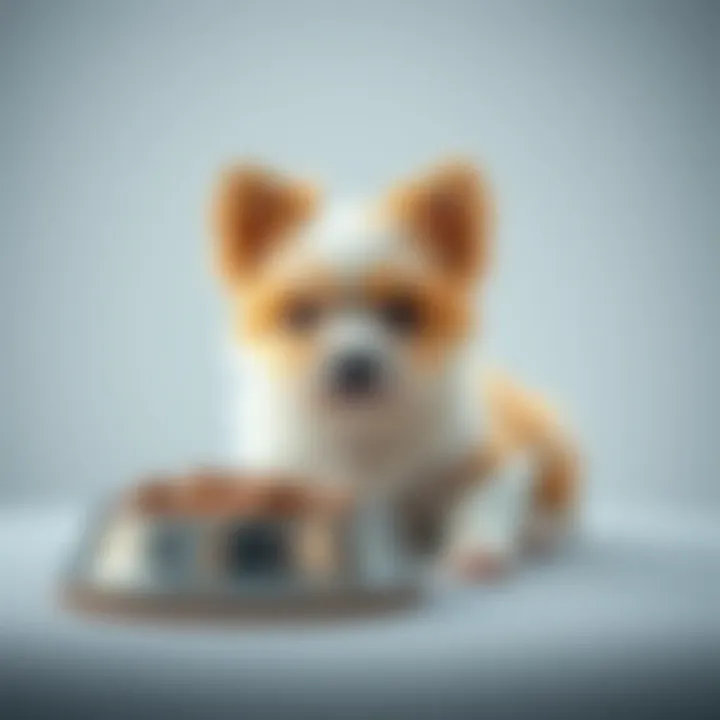Essential Nutrition for Maltese Shih Tzu Puppies


Intro
The bond between humans and dogs is timeless, and it flourishes even more when puppies arrive. Among the delightful breeds, the Maltese Shih Tzu captures hearts with its charming personality and undeniable cuteness. However, while their fun-loving nature steals the show, it is essential for owners to understand their nutritional needs to ensure they grow into healthy adults. Offering a well-balanced diet is paramount for these pups not just to survive, but to thrive. Understanding what goes into their food, how nutrients affect their growth, and what feeding practices work best form the foundation of their well-being.
In this article, we break down the unique dietary requirements of Maltese Shih Tzu puppies, providing insights into various food types, essential nutrients, and tips for selecting quality pet food. Knowledge is key to making informed dietary choices for your fluffy friend, thus ensuring a robust, vibrant life.
Animal Overview
Common Name and Scientific Classification
The Maltese Shih Tzu does not have a formal scientific classification like other species, as it is a hybrid breed or designer dog, formed from crossing the Maltese with the Shih Tzu. This combination yields a small yet energetic dog, often tagged as a toy breed.
Physical Characteristics
Maltese Shih Tzu puppies typically showcase a lovely blend of both parent breeds. They inherit a flowing, silky coat that can be various colors such as white, gold, or cream. These fur balls usually weigh between 6 to 12 pounds when fully grown and stand about 9 to 11 inches tall. Their big, expressive eyes often twinkle with curiosity, reflecting their alert and affectionate nature. The breed's facial structure—with a short snout and flat face—contributes to their playful demeanor.
Habitat and Distribution
Originally, the Maltese breed found roots in the Mediterranean region, while the Shih Tzu has a noble lineage from ancient China. Over time, the Maltese Shih Tzu has spread worldwide due to its appealing nature, fitting in well in both small apartments and family homes. They adapt remarkably to their surroundings, providing companionship wherever they go.
When considering the right food, it’s imperative to factor in their size, energy levels, and individual health requirements that may emerge as they grow.
Behavior and Social Structure
Communication Methods
Puppies of this breed are known for their vocal nature, often barking to express excitement, alertness, or even boredom. They use body language as well, showcasing their feelings through tail wagging, ear positioning, and playful antics. Paying attention to these cues can deepent the bond between the dog and the owner, helping understand the puppy’s needs.
Social Hierarchies
Socially, Maltese Shih Tzus thrive on companionship and engagement. They typically enjoy mingling with humans, other dogs, and even pets of different species in the home. Establishing a positive hierarchy is essential, as they often look for leadership. Consistent training helps in setting boundaries and enhancing their social behaviors.
Mating and Reproductive Behavior
The mating behavior of Maltese Shih Tzus naturally entails refined instinct, particularly in the female when she is in heat. However, responsible breeding practices are crucial to ensure the well-being of both parents and puppies. Various health issues are attached to this hybrid breed, so awareness and precaution are vital for maintaining healthy lines.
Conservation Status
While the Maltese Shih Tzu is a popular breed, awareness regarding its breeding practices is critical.
Current Population Trends
Currently, the population of Maltese Shih Tzus is stable in many regions, owing to their popularity, but there is always the risk of irresponsible breeding practices due to their demand. This can lead to unfortunate genetic health problems that might appear in offspring.
Threats and Challenges
The biggest threat is often overbreeding, leading to health issues stemming from genetic risk factors. Other challenges may include the rise of puppy mills that prioritize profit over the welfare of the dogs.
Conservation Efforts and Success Stories
Numerous rescue organizations and dedicated breeders advocate for proper breeding, health checks, and awareness programs to educate potential owners. Adoption efforts and responsible breeding initiatives are some positive steps taken in recent years.
As this breed matures into adulthood, focusing on their nutritional needs is key to unlocking their potential and ensuring they remain healthy companions throughout their lives.
Understanding Maltese Shih Tzu Puppies
Understanding the unique characteristics and needs of Maltese Shih Tzu puppies is the first step toward providing optimal nutrition and overall care. This hybrid breed combines the playful nature of the Maltese with the affectionate demeanor of the Shih Tzu, creating a small but vibrant companion. Being informed about their traits helps pet owners make well-rounded choices that promote healthy growth and development.
The Maltese Shih Tzu puppies are particularly notable for their playful disposition and strong loyalty. They not only thrive on companionship but also require mental and physical stimulation to prevent boredom. Their small size necessitates careful attention to diet, as overfeeding can lead to serious weight issues. Knowing what makes them tick allows owners to tailor their approach, addressing both dietary needs and behavioral stimulation effectively.
Characteristics of the Maltese Shih Tzu
The Maltese Shih Tzu boasts a striking appearance, typically characterized by a long, flowing coat that requires regular grooming. Their charming looks are complemented by their affectionate demeanor. Social by nature, these pups are generally friendly towards other dogs and people alike. They adapt well to various living environments, making them suitable for apartment dwellers as long as they get daily exercise.
In terms of temperament, these pups are often described as vibrant and eager to please. They tend to bond closely with their families, often following owners from room to room. Their intelligence can be a double-edged sword; while they can learn commands quickly, they may also display a stubborn streak, necessitating a patient training approach. That said, using positive reinforcement works wonders with this breed.
Developmental Stages
Maltese Shih Tzu puppies undergo several key developmental stages that are essential for growth. Awareness of these phases can help owners better plan nutritional strategies and training schedules.
- Neonatal Phase (0-2 weeks): During this stage, puppies are entirely dependent on their mother’s milk. They are in a state of development that needs warmth and sound nutrition.
- Transitional Phase (2-4 weeks): Puppies start to open their eyes, and ears, and get their little legs moving. Nutrition begins to evolve as they gradually transition to gruel.
- Socialization Phase (4-12 weeks): This is a critical time for socialization. While their diet must be rich in protein to support their rapid growth, interactions with other animals and humans shape their behavior.
- Juvenile Phase (3-6 months): As they approach this stage, their dietary needs shift to support ongoing bone development and overall energy levels. It is also useful for owners to start establishing routines during this time.
- Adolescent Phase (6 months-1 year): At this stage, pups may begin to test boundaries. Their diets should still be monitored closely, focusing on sustaining healthy growth while minimizing risks of obesity.
Understanding these stages empowers Maltese Shih Tzu owners to make informed decisions that positively impact their puppies' health and well-being.
Nutritional Needs of Maltese Shih Tzu Puppies


When it comes to raising Maltese Shih Tzu puppies, understanding their nutritional needs is like knowing the map of a treasure island. It’s pivotal to provide a balanced diet that supports their growth and health. Small breed puppies, like the Maltese Shih Tzu, have unique dietary requirements as they grow. A proper diet not only fosters healthy development but also contributes to their energy levels and overall well-being. Furthermore, educating yourself about their specific needs in terms of nutrients will help you make informed decisions when shopping for food, whether it be kibble, canned food, or homemade options.
Understanding Puppy Nutrition
Puppy nutrition isn’t just about filling a bowl. It's about striking a balance tailored to the developmental and energy needs of Maltese Shih Tzu puppies. These little furballs need a higher concentration of nutrients than adult dogs because they are going through rapid growth phases. Proper nutrition directly influences their immune system, joint health, and even their behavior. When formulating a diet, consider aspects such as breed size, age, and activity level. A well-nourished puppy is less likely to encounter health issues later on, making it a wise investment in both time and care.
Key Nutrients for Growth
Proteins
Proteins form the backbone of a puppy's diet. They're crucial for building muscles, tissues, and enzymes. For Maltese Shih Tzu puppies, high-quality animal protein sources, like chicken, beef, or fish, should dominate their food. One of the standout features of proteins is their amino acid composition. These essential building blocks not only support growth but also aid in cognitive development. However, watch out for low-quality protein sources, as they can lead to nutritional deficiencies. Choosing the right protein ensures your puppy flourishes into a vibrant adult dog.
Fats
Fats often get a bad rap in human diets, but they're indispensable for our puppies. These nutrients provide a concentrated source of energy and help with the absorption of fat-soluble vitamins. For Maltese Shih Tzu puppies, healthy fats, particularly omega-3 and omega-6 fatty acids, can promote a shiny coat and healthy skin. The unique characteristic of fats is that they can be a major energy boost in a small quantity, which is perfect for these small breeds. However, moderation is key; too much fat can lead to obesity, which is a concern with the Maltese Shih Tzu's predisposition to weight gain.
Carbohydrates
While they aren’t essential like proteins and fats, carbohydrates play a supportive role in a balanced diet. They can provide a quick energy source, particularly for active puppies. Whole grains, fruits, and veggies can enhance a puppy's diet with necessary fibers and nutrients. The beneficial aspect of carbohydrates is that they can aid in digestion and can sometimes prevent certain health issues. However, some puppies may have sensitivities to grains, so careful monitoring is crucial when introducing new food containing carbs.
Vitamins and Minerals
Vitamins and minerals are the unsung heroes in the dietary toolkit. They contribute to various bodily functions, from bone health to immune support. Crucially, the right balance will promote optimal growth and longevity for your Maltese Shih Tzu. Key vitamins, such as A, D, E, and several B vitamins, work hand-in-hand with minerals like calcium and phosphorus to maintain overall health. Yet, too many supplements or an unbalanced diet can cause toxicity; hence, it’s vital to consult with a veterinarian or a pet nutritionist to determine the right mix of vitamins and minerals for your growing puppy.
"A well-balanced diet is like the golden ticket to a happy, healthy puppy."
Types of Dog Food for Maltese Shih Tzu Puppies
When it comes to raising a Maltese Shih Tzu puppy, the type of food you choose is pivotal. Selecting the appropriate dog food can significantly influence your puppy's growth, behavior, and overall health. This section will offer insights into various types of dog foods specifically tailored for this delicate breed. It'll cover the benefits and considerations associated with each food type, helping you make informed choices for your furry friend.
Dry Kibble
Dry kibble is often the most popular choice among dog owners for several good reasons. One notable benefit of dry food is its convenience. Kibble can be left out for longer periods without spoiling, making it easier for busy families. Furthermore, the crunchiness of kibble helps promote dental health by reducing plaque and tartar accumulation on your puppy's teeth.
However, not all dry kibble is created equal. When selecting a kibble for your Maltese Shih Tzu, look for options specifically formulated for small breeds. These formulas typically contain the right balance of nutrients tailored to their unique metabolism. Ingredients to watch out for include real meat as the first component, as well as healthy fats and an absence of fillers.
Here are some points to ponder when considering dry kibble:
- Protein-Rich Ingredients: Ensure the first ingredient is quality meat, like chicken or lamb.
- Size of Kibble: Opt for smaller pieces so it’s easier for puppies to chew.
- Preservatives: Check for natural preservatives instead of artificial additives.
Wet Food
Wet food can be a great alternative or a complement to dry kibble. Its high moisture content ensures hydration, which is particularly valuable for puppies. Maltese Shih Tzus are prone to dental issues; moist food can entice pups who are fussy eaters, making it easier to satisfy their nutritional needs and maintain their weight.
However, while wet food can have its perks, it’s essential to consider the balance in their overall diet. Often more calorically dense, wet food should be fed in moderation alongside dry kibble to avoid excessive weight gain. Furthermore, ensure you choose high-quality varieties with recognizable ingredients to give your puppy the nutrition they require.
Some considerations for wet food include:
- Balanced Nutrition: Check if the product meets AAFCO standards for complete and balanced nutrition.
- Storage: Open cans or packages need refrigeration, so account for that.
- Flavor Variety: Offering different flavors can keep meal times interesting for your puppy.
Raw Food Diet
A raw food diet, sometimes called the BARF diet (Bones and Raw Food), is predicated on feeding dogs a diet more similar to what their ancestors consumed. This often includes raw meat, bones, organs, and raw fruits and vegetables. Proponents argue that it leads to brighter coats, cleaner teeth, and higher energy levels.
However, this type of diet requires careful planning. Improperly balanced raw meals can lack essential nutrients or lead to health issues. You will want to consult with a veterinarian or a pet nutrition expert if you're considering this route, as it's critically important to ensure that your Maltese Shih Tzu gets all the necessary nutrients.
A few points to keep in mind:
- Hygiene: Raw meat can carry bacteria, so proper handling and storage are critical.
- Balanced Meals: You’ll need to balance meat, organs, and bones to ensure comprehensive nutrition.
- Monitor Health: Regular vet check-ups will be essential to monitor your puppy’s health while on a raw diet.
Homemade Meal Options
Preparing homemade meals for your Maltese Shih Tzu can be a wonderful way to ensure they receive high-quality nutrition without any questionable additives. Cooking at home allows for complete control over ingredients, tailoring meals to suit dietary needs and preferences. However, it requires time, knowledge, and careful formulation to provide balanced nutrition.
It's crucial to include various food groups to meet all your puppy's requirements:
- Lean Proteins: Chicken, turkey, or fish should be the foundation.
- Fruits and Vegetables: Ingredients like carrots and blueberries can be great for vitamins and antioxidants.
- Grains or Carbs: Consider adding rice or oats for energy.
While preparing food at home, always consult with your vet to ensure that your recipes meet nutritional standards for growing puppies. This route certainly provides a more personal touch to feeding, but balance and variety will be key to keeping your pup healthy and thriving.
In summary, understanding the various types of dog food can equip you for making the best choices for your Maltese Shih Tzu puppy. Each food type offers unique advantages, and thoughtful consideration will ensure that your furry companion gets the nourishment they need to flourish.
Choosing Quality Pet Food Brands
Selecting the right pet food for your Maltese Shih Tzu puppy is like picking the best shoelaces for a pair of new sneakers; they may not seem like a big deal, but they can absolutely make or break the overall experience. Quality pet food brands play an essential role in ensuring that your pup receives optimal nutrition, which is crucial during their formative months. A good brand not only provides a balanced diet but also aligns with the specific needs of a Maltese Shih Tzu, whose small size and unique health concerns warrant careful consideration when it comes to dietary choices.
When vetting potential brands, there are several elements to keep in mind:


- Reputation: Established brands with a positive history often reflect reliability. A reputation built over time means that the company likely adheres to stringent quality control standards.
- Transparency: Brands that are open about their sourcing and manufacturing processes instill confidence in pet owners. Look for companies that provide detailed information about where and how their ingredients are sourced.
- Research and Development: Top-notch pet food companies invest in continuous research to ensure their products meet evolving nutritional standards. This means not just slapping a label on a bag, but a commitment to ongoing improvement.
Therefore, as a proactive pet parent, it’s imperative to dive deeper into the brands, scrutinizing their ingredient lists and production practices.
Identifying Trustworthy Brands
Given the overwhelming number of options available today, identifying trustworthy brands can feel like searching for a needle in a haystack. A good start is to look for brands that come recommended by veterinarians. After all, they have the expertise to guide you on what’s best for your furry companion. Additional attributes to consider:
- ACFCO Compliance: Brands that adhere to the Association of American Feed Control Officials (AAFCO) guidelines ensure that their products meet specific nutritional standards.
- Reviews and Testimonials: Consumer reviews can offer valuable insights, although it’s important to remember that experiences can vary.
- Certifications: Certifications from pet nutrition boards or state regulatory bodies can indicate a brand’s commitment to quality and safety.
Being cautious and informed while choosing a brand can prevent potential health issues down the line.
Understanding Ingredients
When you pick up a bag of dog food, it's tempting to just glance over the label and toss it in your cart. However, understanding the ingredients list is crucial for ensuring the health of your Maltese Shih Tzu puppy. Here’s what to look out for:
- Protein Sources: Look for recognized protein sources like chicken, lamb, or fish at the top of the list. Avoid vague terms like "meat by-products," which could be anything but what you want for your puppy.
- Whole Grains vs. Fillers: While some grains like brown rice and oats are beneficial, fillers like corn or soy provide little nutrition and could potentially lead to allergies.
- Fats: Healthy fats are crucial for your puppy’s skin and coat, so look for named sources like chicken fat or fish oil.
- Vitamins and Minerals: These micronutrients are essential for growth and immune support. Check that the product includes a good balance of vitamins both in listed ingredients and guaranteed analysis.
By educating yourself on how to interpret ingredient lists, you will be better equipped to make informed decisions that support your puppy's health.
"Invest your time and energy into understanding the food you give your Maltese Shih Tzu, because a well-fed puppy is a happy puppy."
Taking the time to choose high-quality brands is a crucial step toward ensuring that your puppy receives the nourishment they need to thrive.
Feeding Guidelines for Maltese Shih Tzu Puppies
Understanding how to adequately feed your Maltese Shih Tzu puppy is a cornerstone of ensuring their growth and wellbeing. This hybrid breed has unique nutritional needs, and proper feeding guidelines help prevent diseases and promote a long, healthy life. A structured approach to feeding not only aids in physical development but also fosters a bond between you and your puppy. Fostering this connection starts with understanding their needs.
Serving Sizes
Determining the right serving size for your Maltese Shih Tzu puppy is crucial. These puppies are small, but their energy requirements can be quite substantial due to their playful nature. It is generally advisable to consult the guidelines provided on pet food packaging; however, some general rules can apply.
Typically, a Maltese Shih Tzu puppy weighing around five pounds needs approximately one to one and a half cups of food per day, divided into three to four meals. Here are a few key points to consider:
- Age Matters: Younger puppies require more nutrition compared to older ones. As they grow, you might notice a decrease in appetite or a tendency to nibble rather than devour their food.
- Body Condition: Regularly assess your puppy's body weight. If they seem too thin or overweight, it may be time to adjust their serving sizes. Feel free to consult your vet for tailored advice.
- Caloric Density: The type of food matters, too. Higher quality food typically contains more calories and nutrients per serving. Ensure you read through the nutritional information and adjust portions accordingly.
Frequency of Feeding
Establishing a consistent feeding routine is equally important. Puppies thrive on predictability, as it helps them feel secure and can aid their digestive health. For Maltese Shih Tzu puppies, feeding frequency depends on their age as well.
Here’s a general guideline:
- Under 3 Months: Feed them four times a day to ensure they get all the nutrients for their rapid growth.
- 3 to 6 Months: Transition to three meals a day. Halfway through this stage, you might notice they can go a bit longer between meals.
- 6 Months and Older: At this age, two meals a day should suffice. They may have reached a point where their nutritional requirements level off.
It's crucial to keep in mind that changes in feeding frequency shouldn't be abrupt. Gradually adjust meal times to avoid upsetting their tummy. Smaller, more frequent meals are easier to digest for puppies, while adult dogs can handle more substantial portions less frequently.
Common Dietary Concerns
Understanding common dietary concerns for Maltese Shih Tzu puppies is crucial for any pet owner. This breed is particularly susceptible to certain health issues, making it essential to provide a well-rounded diet. Monitoring their nutritional intake ensures that they thrive and grow in a healthy manner, avoiding problems tied to poor diets. Addressing these concerns early on can help set the foundation for a longer, healthier, and happier life.
Food Allergies and Sensitivities
Food allergies can sneak up on even the most vigilant pet owners. Maltese Shih Tzus may face sensitivities to specific ingredients such as wheat, soy, or certain proteins. Recognizing the signs is half the battle; itching, strange rashes, or upset stomachs can indicate an allergy. Here are some key points to keep in mind:
- Common allergens: Common food allergens include beef, chicken, eggs, and dairy. Each dog's threshold will vary, so it’s wise to introduce new foods gradually.
- Reading labels: Make it a habit to check ingredient lists on pet food. If it has a long list of unrecognizable chemicals, it may be best to steer clear.
- Vet consult: Always consult with a veterinarian when introducing new foods, particularly if you suspect an allergy. They may recommend an elimination diet for better results.
It’s vital to keep an eye out for these reactions. An allergy can lead to more severe health complications if ignored. Knowing your puppy's body and what agrees with it can make a world of difference.
Weight Management Issues
Keeping a close watch on weight is essential for Maltese Shih Tzu puppies. This breed is prone to obesity, which can bring about a slew of health concerns, from joint problems to diabetes. Maintaining a balanced diet is paramount. Consider these tips to manage your puppy’s weight effectively:
- Control portions: Measure food portions precisely. Don't just eyeball it; use a scale or measuring cup if necessary.
- Limit treats: While it's tempting to indulge them, treats should only be a small fraction of their diet. Opt for healthy snacks over sugary ones.
- Regular activity: Exercise isn’t just good for weight management. It promotes general health and aids in mental stimulation. Short play sessions can be great.
Keeping track of your puppy's weight can be straightforward with regular check-ups at the vet. Monitoring their weight early on can help stave off complications. A balanced diet combined with proper weight management goes a long way in ensuring your Maltese Shih Tzu thrives throughout its life.
"An ounce of prevention is worth a pound of cure." Monitoring dietary concerns now will pay dividends later in life.
Supplementation for Maltese Shih Tzu Puppies
Providing a well-rounded diet for your Maltese Shih Tzu puppy is crucial, but sometimes, the standard food may not cover all their nutritional needs. This is where supplementation comes into play. It can bridge the gap, ensuring that your pup gets all the essential vitamins and minerals for optimal health. While it's not always a necessity, certain situations may demand additional nutrients.
Supplements can enhance your puppy’s diet, reinforcing their immune system, promoting healthy growth, and helping with specific health issues. But like a double-edged sword, the wrong application can do more harm than good. Owners must approach supplementation with care and consult a veterinarian for personalized advice. Knowing when and what to supplement is key to providing a beneficial, balanced diet for your furry friend.
When to Supplement


Timing can be everything in puppy nutrition. Certain signs might indicate that your Maltese Shih Tzu could benefit from some extra nutrients. For instance, if your puppy exhibits a lack of energy, poor coat condition, or frequent digestive issues, it could be time to look into supplements.
Moreover, if your puppy is transitioning from one type of diet to another—say from puppy kibble to raw food—it might require additional vitamins to ease that transition. This ensures they continue to flourish as they adapt to the new diet.
In cases where puppies have health issues such as allergies or specific deficiencies identified by a vet, supplementation becomes even more crucial. Here are some common scenarios that warrant considering additional nutrients:
- Rapid growth phases: Puppies grow at an astounding rate, and sometimes their food cannot keep up.
- Recovering from illness or surgery: A boost in nutrients can aid in faster recovery.
- Gastrological sensitivities: If your puppy has any stomach issues, essential fatty acids or probiotics might be beneficial.
Types of Supplements
Supplementation can vary greatly, and the choices can sometimes be overwhelming. It’s important to choose the correct type based on your puppy's specific needs. Below are some of the common supplement types:
- Multivitamins: These provide a broad spectrum of nutrients that may be missing from a puppy’s diet.
- Omega-3 Fatty Acids: Known for their anti-inflammatory properties, these are great for skin health and joint support.
- Probiotics: These can help maintain a balanced gut flora, which is essential for overall health. They can be especially useful when dealing with digestive issues.
- Calcium and Phosphorus Supplements: These are crucial for bone health, particularly in growing puppies. Avoid over-supplementing as too much can lead to skeletal problems.
- Joint Supplements: Such as glucosamine, are important for ensuring healthy joints as your puppy grows and engages in activities.
- Look for those specifically formulated for small breeds, keeping Maltese Shih Tzu in mind.
- Fish oil is a popular choice, but ensure it’s derived from safe sources.
Before going ahead with any supplements, consult your veterinarian to make sure you’re making the right choices. They can provide insights into the best products on the market. It’s essential to remember that quality matters.
"Always prioritize a vet’s guidance when it comes to supplementation; sometimes less is more."
In sum, supplementation for Maltese Shih Tzu puppies can be highly beneficial in certain scenarios but should be approached with knowledge and caution. Providing a balanced diet is the foundation, but supplements can help build a solid structure of health and well-being for your furry companion.
Monitoring Your Puppy’s Health
Monitoring your Maltese Shih Tzu puppy's health is a vital aspect of being a responsible pet owner. This process goes beyond simple observation. It's about understanding the signs and addressing any underlying issues that could affect their growth and well-being. Health monitoring can drastically improve your puppy’s quality of life, ultimately fostering a joyful bond between you and your furry companion.
Signs of Nutritional Deficiencies
One of the key elements in watching over your puppy's health is recognizing signs of nutritional deficiencies. Puppies, like young children, rely heavily on a balanced diet to fuel their rapid development. If their diet lacks essential nutrients, it may manifest in both physical and behavioral symptoms.
Some common signs include:
- Poor coat condition: A dull, flaky, or thinning coat might indicate a lack of fatty acids, proteins, or vitamins.
- Weight fluctuations: Unexplained weight loss or gain can suggest an imbalance in caloric intake, or insufficient nutrients necessary for their stage of growth.
- Dental issues: Bad breath or gum problems may stem from not receiving enough calcium or phosphorus.
- Digestive problems: Signs like diarrhea or an upset stomach can point to an inadequate balance of fiber or excessive fillers in their food.
- Lethargy: If your puppy seems more tired than usual, it may be a sign they aren’t getting enough energy-providing nutrients.
It's important to keep your eyes peeled for these indicators. If you notice anything unusual, consult your veterinarian promptly. This proactive approach can prevent further complications.
Regular Veterinary Check-ups
Another cornerstone of ensuring your Maltese Shih Tzu thrives is through regular veterinary check-ups. These appointments serve multiple purposes: evaluating your puppy's overall health, discussing his nutritional needs, administering vaccinations, and monitoring growth.
Veterinary professionals can provide tailored advice based on your puppy’s age, weight, and activity level. They can also help in determining whether the food you're providing meets their needs. Keeping a close relationship with your veterinarian is crucial. Here are some reasons to prioritize these visits:
- Early detection of health problems: Just like humans, pets are not always forthcoming about their ailments. Regular check-ups help spot potential issues before they become serious.
- Guidance on vaccinations and preventatives: Your vet will discuss necessary vaccinations and preventive care specific to the Maltese Shih Tzu breed.
- Dietary consultations: A vet can give you insights into any necessary dietary changes or additions, like supplements, ensuring your puppy gets the best possible nutrition.
- Tracking growth and development: Keeping tabs on your puppy’s weight and overall condition helps you adjust their food intake for desired growth trajectories.
Establishing a routine for vet visits—every 6 to 12 months for healthy puppies—can save time and trouble down the line. This kind of proactive care plays an essential role in ensuring that your Maltese Shih Tzu grows up happy and healthy.
Transitioning to Adult Food
Transitioning from puppy food to adult food is a crucial phase in a Maltese Shih Tzu's development. This change is not merely a formality; it plays an important role in ensuring that your pet continues to receive appropriate nutrition as it grows and matures. The nutrients required by puppies are quite different compared to those needed by adults. As your puppy grows, the caloric density and composition of the food must align with its changing needs. Getting this transition right can prevent issues like obesity, nutrient deficiencies, and digestive problems.
When to Transition
Deciding when to make the switch from puppy food to adult food requires observation and knowledge of your Maltese Shih Tzu's growth patterns. Generally speaking, this transition should occur around 12 months of age. However, because each dog is unique, several factors should be taken into account:
- Growth Rate: If your puppy has reached its adult size, it’s likely time to transition.
- Weight Management: If your puppy is heavier than average for their age, early transitioning may help control weight gain.
- Energy Levels: If your puppy seems to be more energetic and hyperactive or less interested in food, these could be signs that they are ready for adult nutrition.
Ultimately, a conversation with your veterinarian can provide personalized guidance based on your puppy’s specific needs.
How to Transition
Forcing a sudden change in diet can upset your puppy's stomach. Hence, a gradual approach is recommended. Here’s an effective method to make the transition smoother:
- Start Mixing: Begin by combining a small amount of adult food with the puppy food. A good ratio is 25% adult food and 75% puppy food.
- Increase Gradually: Over the next week, gradually increase the proportion of adult food while decreasing puppy food. Each few days, adjust the ratio until you reach full adult food consumption.
- Monitor Reactions: Keep an eye on your puppy’s reactions during this transition. If you notice any signs of digestive upset, such as vomiting or diarrhea, slow down the process or consult your veterinarian.
In summary, the transition to adult food is essential for ensuring your Maltese Shih Tzu remains happy and healthy. Following a structured approach, while considering your puppy’s individual needs, can help lay the foundation for a healthy adult life.
Finale
Recap of Dietary Needs
In summary, Maltese Shih Tzu puppies thrive on a balanced diet that incorporates a variety of key nutrients. These nutrients include proteins for muscle development, healthy fats for energy, carbohydrates for essential fuel, and a selection of vitamins and minerals that support overall health. Each of these components plays a pivotal role in ensuring your puppy grows into a healthy adult dog. Additionally, the size of their meals and the frequency of feeding should align with their growth stages, making sure they’re not overfed or underfed.
Monitoring for allergies and sensitivities is vital, as some Maltese Shih Tzu may be prone to food-related issues. Thus, selecting quality pet food brands that prioritize wholesome ingredients can’t be emphasized enough. This way, you safeguard your puppy against potential dietary problems and pave the way for a happier, healthier life.
Final Recommendations
As a final thought, it's worth reiterating a few recommendations. Begin with a high-quality puppy food tailored for small breeds that lists real meat as the primary ingredient. Pay close attention to the feeding guidelines provided by the manufacturer, but don’t hesitate to consult your veterinarian to tailor the portions specifically to your puppy's needs.
Also, consider incorporating some variety into their diet—whether through different types of food or carefully prepared homemade options—always ensuring that you maintain a balance of nutrients. Regular vet check-ups should not be overlooked; they're essential in monitoring your puppy's growth, health, and any changes in their dietary requirements.
Ultimately, the effort you put into understanding and providing optimal nutrition for your Maltese Shih Tzu puppies will yield immeasurable rewards. A well-nourished puppy is not just a healthier one, but one that will bring you years of joy and companionship.







